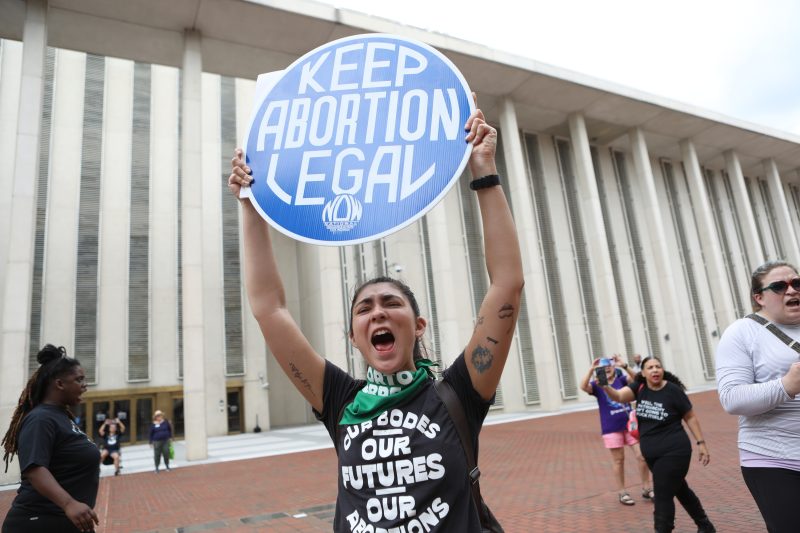A central feature of Donald Trump’s politics has long been that they are malleable. He makes the pitch that he thinks will work best in the moment to the targeted audience, not fretting too much about where it might conflict with what he’d said in the past. His base of support has never indicated a lot of concern about this pattern, so Trump doesn’t either.
So it seemed perhaps inevitable that, as Republicans continue to lose presumably winnable contests in the post-Roe v. Wade era, Trump might himself start suggesting that his party moderate on the issue of abortion. The formerly pro-abortion rights Trump was never a true believer on the issue, after all, instead seeing it (correctly) as a vehicle for solidifying the support of religious Republicans. If the issue became an albatross, why wouldn’t he adjust his position?
Sure enough: New reporting from Rolling Stone indicates that Trump is doing exactly that.
“[T]he ex-president has warned leaders in off-the-record conversations that Republicans risk ‘losing big’ — in Trump’s words — unless they follow his lead. He has warned the leaders to shift their own messaging,” the magazine’s Tessa Stuart and Asawin Suebsaeng report. “ … Trump has for several weeks vented to confidants that the GOP is ‘getting killed on abortion’ or on ‘the abortion issue,’ according to three people who’ve heard him use this phrasing on different occasions.”
Those Republicans within earshot of Trump’s ruminations might justifiably take his words with a grain of salt. Trump’s political analyses tend to be some combination of what he saw on Fox News and what he thinks is best for himself, so they might not necessarily pay off for other candidates. But in this case there’s a lot of evidence that the party’s response to the overturning of federal protections for abortion has, in fact, done a lot of damage — and threatens to do a lot of damage in the future.
Let’s start by considering ballot initiatives focused on abortion. In 2014 and 2018, there were five initiatives at the state level involving abortion or abortion-related issues, according to Ballotpedia. Two, on the ballot in the red states of Alabama and Tennessee, went against the pro-abortion rights position. Last year, there were six initiatives. In each case, the pro-abortion rights position emerged on top.
But something interesting happens when we adjust the final margins on the initiatives for the state’s presidential vote. In each case, the results of the ballot initiatives were friendlier to the abortion rights position than they were to the Democratic presidential candidate. In other words, abortion-related initiatives since 2014 have uniformly run to the left of presidential politics.
Even before Roe was actually overturned, public opinion had shifted in favor of abortion rights. Gallup’s annual polling on abortion was completed soon after the draft decision was leaked; it found that the percentage of Americans saying abortion should always be illegal dropped by a third from 2021 to 2022. The percentage of Americans identifying as “pro-life” fell below 40 percent for the first time since the mid-1990s — soon after partisan views of abortion had begun to diverge.
That said, when Kansas rejected a limit on abortion last summer, I was skeptical that it offered much insight into November. After all, this was just a ballot initiative, something that could be a spur for turnout outside of the context of more nuanced electoral considerations.
I was wrong. Kansas did offer useful insight. Analyses conducted after the midterms suggest that a lot of voters were particularly motivated by abortion to come out and cast a ballot, no doubt contributing to the unexpectedly strong performance of Democratic candidates. As Brookings noted soon after the election, exit polls indicated that abortion ran even with inflation in a number of states as a core issue for midterm voters and, in some states, easily surpassed it. KFF produced a detailed analysis showing the extent to which abortion was a central consideration during the midterms.
Poll results like these are not definitive proof that abortion was the central factor in the midterm results, certainly. Polling is imperfect and people’s motivations for their votes complicated. In the wake of the unexpectedly strong performance by the liberal candidate in Wisconsin’s Supreme Court runoff election last week, for example, consultants for the winning candidate suggested that the result wasn’t simply about abortion but, more broadly, about casting the conservative candidate as an extremist.
Campaign consultants have a vested interest in highlighting their own role in a successful campaign, of course, but it’s a fair question. President Biden made a last-minute case that Republicans were hostile to liberal democracy, an argument pivoting off the ongoing House select committee hearings centered on the Jan. 6 Capitol riot. It’s certainly possible that abortion bolstered a sense of extremism to aid the Democrats. The polls results identified above, though, suggest that abortion was potent on its own.
That distinction is somewhat unimportant when considering 2024. The framing of the issue in the Rolling Stone article is specifically that Trump (mirroring others) thinks his party is going too far on the issue, being too extreme. Whether voters reject the party’s position because it’s too extreme or too extreme on abortion is not that important electorally.
It’s likely that the party will continue to leave itself open to this attack. Modern politics, particularly on the right, is centered on generating attention and contributions from a core set of deeply engaged voters. There’s almost always more to be gleaned from an extreme position than a moderate one and the new, unbounded terrain in which the party finds itself yields plenty of opportunity for staking out more restricted positions.
Consider Sen. Tim Scott (R-S.C.). He began his just-announced presidential bid in uncertain fashion after trying and failing to clearly articulate his position on the issue. His insistence that he was “pro-life” was sufficient when the party’s position was that abortion not be federally protected. Now that the issue is subject to state-level law or judicial decrees, there’s little agreement on what makes the most political sense. Abortion’s become one of a number of similar policy headaches for the party, where the most energized part of the base wants something that most Americans don’t.
The long-term politics of abortion may be worse for the party. As the KFF data show, it’s younger Americans who are most energized by the issue, and not generally in favor of curtailing abortion access. A heavily Democratic-voting younger generation is seeing a Republican Party that’s moving further away from them — movement that will probably color perceptions of the party for some time.
Elections can hinge on last-minute shifts in what’s motivating voters to vote. A lot can happen before 2024 that reduces the salience of abortion (or extremism) as a consideration. But Trump’s got a point: His party isn’t obviously making its chances more viable with its current approach to the issue. It’s quite possibly damaging its electoral prospects over the long term, too.








